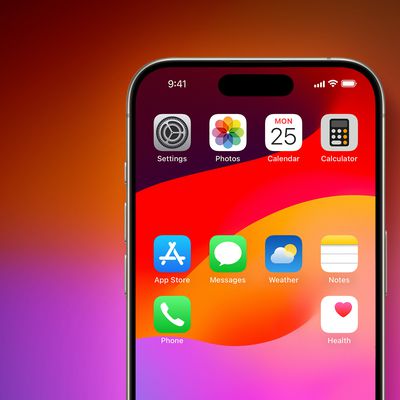Epic Games is once again after Apple, this time accusing the Cupertino company of violating a court ruling that requires Apple to allow developers to offer in-app links to direct customers to third-party purchase options on the web.

Apple tweaked its U.S. App Store policies back in January, and developers are permitted to put one link in their apps that leads to a website where customers can make a purchase without using the in-app purchase system. Apple is still charging commission for these purchases, requiring developers to pay between 12 and 27 percent (three percent lower than the 15/30 standard fee).
Epic Games is unhappy with the fee that Apple continues to charge, today telling the court that Apple has not complied with the order, and asking that Apple be held in contempt of court. Epic Games claims that the fees make the links "commercially unusable," thereby subverting the injunction.
Apple violates the Injunction in three ways. First, with respect to External Links, Apple has imposed new fees and enacted a slew of new rules that work together to make the links commercially unusable. This new fee and accompanying web of restrictions subverts the purpose of the Injunction, allowing Apple to continue extracting its excessive commissions and making it effectively impossible for a developer to inform users about, and direct users toward, an alternative platform for making a purchase.
Second, Apple continues to categorically prohibit any steering using "buttons" or "other calls to action". Specifically, Apple does not allow External Links that resemble a "button" in any way.
Third, Apple's Guideline 3.1.3 still prohibits certain apps, including all multiplatform services (i.e., apps that operate across multiple platforms and allow users to access the same content across these platforms, including popular games such as Minecraft), from "within the app, encourag[ing] users to use a purchasing method other than in-app purchase". This language expressly contravenes the Injunction by prohibiting any steering to alternative purchasing methods.
Epic Games collected statements from other developers that have spoken out against Apple's App Store fees, including Paddle CEO Christian Owens and Down Dog CEO Benjamin Simon.
Apple was initially ordered to make the App Store changes in 2021 as part of its court battle with Epic Games. Judge Yvonne Gonzalez-Rogers, who oversaw the case, took issue with Apple's anti-steering rules. Apple was able to delay implementing the App Store changes for a few years while it appealed, but none of the courts decided to change the verdict. Apple ultimately took it to the Supreme Court, but the court declined to hear the case, so Apple had to comply immediately at the beginning of the year.
Apple has said that it is fully in compliance with the injunction. From Apple's January statement of compliance:
As of January 16, 2024, Apple has fully complied with the Injunction: It is striking the relevant parts of the App Store Review Guidelines applicable to apps on the U.S. storefronts of the iOS and iPadOS App Stores and implementing new rules that permit developers to (i) include in their apps buttons or links with calls to action that direct customers to purchasing mechanisms in addition to IAP and (ii) communicate with customers through points of contact obtained voluntarily from customers through account registration within the app. As a result of these changes, developers have the option of informing consumers, both within and outside the app, about alternative purchase mechanisms in addition to IAP.
Epic Games claims that the fee Apple charges for the link is "financially unattractive" for developers who want to choose another payment solution, and it "prevents any meaningful competition between payment solutions." The company wants the court to require Apple to bring its policies into compliance with the injunction.






















Top Rated Comments
b) Many companies over the years have brought up these arguments in court. They all fail because it's completely legal to charge a fee for people to use your products and services.
c) At no point is anyone forcing Epic to develop for iOS and at no point did anyone force them to sign the agreement between themselves and Apple.
HTML 5 is an open standard. Java script is available widely. Any company can develop a web app, and distribute it on any 3rd party App Store developed with a similar technology, without paying Apple a dime, or getting Apple’s approval.
What Apple asked for, is if they use Apple technologies, like XCode, iOS SDKs, etc, to pay a commission on digital goods sold. Which almost every big company running subscriptions has bypassed now. Netflix, YouTube or Spotify, do not pay Apple a commission because they are signing up outside the App. And all the banking & finance apps, car apps, bakery apps, shopping apps, etc. They don’t pay Apple anything as well (other than the extremely low $100 a year membership). As they are not selling digital goods.
All this nonsense about 3rd party App Stores and external payment mechanisms are not about giving any real choice to the end-user or companies.
They are just about using Apple’s technologies for free. They want to use Xcode, Apple SDKs and all the polish for their apps that comes with using it, Apple training, Apple engineers’ time, the recognition and reachability that comes from the Apple App Store, all the vetting & advertising that Apple does to achieve it, etc. But they want it for free.
And The EU just making up special rules to do it, is nothing but forced extortion of Apple’s proprietary technologies.
In the process, they don’t care if they break down the trust and no-nonsense experience users buy Apple products for. Or maybe they do want to break it down.
There is little the Apple user in EU (or outside) stands to gain from these, other than a loss in quality of the ecosystem they’ve paid all these years for, just as much as Apple has worked hard building it.